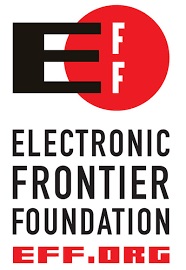
Almost three years ago, the Electronic Frontier Foundation (“EFF”)
began its efforts to reform the U.S. copyright reform process (see the
Electronic Frontier Foundation’s call to Congress for the Next Great Copyright Act). This week, EFF and others are also celebrating the third annual Copyright Week.
This effort is designed to ensure that the public–from technology
users to readers, fans and artists–are heard in debates that are all
too often limited to a few industry lobbies.
EFF believes that this is a critical stage. It’s been four years this week since Internet users staged the largest ever online protest of a bad copyright law, the Stop Online Piracy Act
(“SOPA”), that would have curtailed online speech and created a system
of blacklists for sites and users. Four years ago, millions spoke up and derailed that proposal. But a lot can change in four years, and EFF
states that Hollywood and others are again trying to sneak elements of
SOPA back into the debate, through private agreements with
intermediaries, influence on state officials, extraordinary injunctions
in court, and more.
Beyond site blocking, this summer’s DMCA rulemaking revealed another way in which an imbalanced copyright law hurts the public: allowing Digital Rights Management (“DRM”) software to encroach on the public’s right to use its own physical property. Much of the conversation has focused on cars–a technology that traditionally encouraged tinkering and repair, but
which has become increasingly locked down. The writing is on the wall,
EFF says: unless we fix the law around DRM, it will be used to take away our rights in more and more of the things we own.
The conversation is incomplete, though, when it includes only
discussions about the harms created by overly restrictive copyright. EFF asserts that we also need to pay attention to the benefits of a
cultural commons–a shared collection of material that we all may freely share and build upon. That’s why to kick off Copyright Week 2016, EFF
focused on the public domain, and how the law can foster a stronger one,
by putting forward a set of principles for what copyright law and
policy should look like:
•
Building and Defending a Robust Public Domain. The public domain is our cultural commons and a public trust. Copyright policy should seek to
promote, and not diminish, this crucial resource.
•
You Bought It, You Own It. Copyright policy should foster the freedom
to truly own your stuff: to tinker with it, repair it, reuse it, recycle it, read or watch or launch it on any device, lend it, and then give it away (or resell it) when you’re done.
•
Fair Use Rights. For copyright to achieve its purpose of encouraging
creativity and innovation, it must preserve and promote ample breathing
space for unexpected and innovative uses.• Transparency. Copyright policy must be set through a participatory,
democratic, and transparent process. It should not be decided through
back room deals or international agreements negotiated in secret.
EFF invites the public to follow along, and participate by writing or creating something to support these principles and sharing it on social media with the tag #CopyrightWeek.
This edited article was provided by the Electronic Frontier Foundation, a nonprofit group which advocates for innovators and users of technology. The article has been licensed under the Creative Commons Attribution License.
 Indiana Intellectual Property Law News
Indiana Intellectual Property Law News

